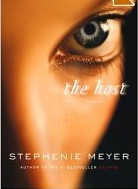
I just finished Stephanie Meyer's new book, The Host. It's your standard body-snatching alien fare, except that it's mostly told from the POV of one of the female body-snatching aliens. Meyer gets around the challenge of creating a totally foreign consciousness by explaining that once in the human body, aliens become mostly human.
"Mostly human" is a good way to describe Meyer's female characters, actually. They are without exception distinguished by an inclination to fall in love with men who think for them. And the men that these heroines love are invariably uber-competent. The centerpiece of their love affairs seems to be the woman's feeling of relief that she doesn't have to make decisions anymore, because X is so strong and good that he can do all that tedious thinking on her behalf. It's Lois Lane and Superman told over and over, except instead of being capable and curious and independent, Lois Lane in this case just sort of sits on the couch all the time waiting for Superman to do something cool.
As irritated as I am by these women, it took me a long time to notice the resemblance between Meyer's characters and the heroines of Anthony Trollope. Trollope was a nineteenth century English writer, like Dickens but with more romance and less satire. I love his stories for his realistic portrayal of people as neither all good nor all bad, and his creation of characters who are not unduly dramatic. (Not unlike me.) However, for all their realism, once his heroines fall in love they tend to abandon all responsibility for thinking and decision-making to the objects of their affections.
The difference, I think, is that Trollope's characters can snap out of it when snapping out of it is warranted. If the love interest proves to be unworthy, or makes a wrong decision, the heroine hesitates and frets and ultimately makes the right choice on her own. She wants to blindly follow his lead, but her good sense won't let her. For example, in Trollope's Nina Balatka, Nina's lover, Anton, asks her to search her father's things for something belonging to Anton. She is reluctant to spy on her father.
" 'Dear Anton,' she said, appealing to him weakly in her weakness, [Editor's note: heh.] 'if you did but know how I love you!'
'You must prove your love. [...] You must comply in everything with me.'"
However, Nina eventually refuses to spy on her father. (I haven't finished this one yet. Possibly she gets all spineless later. But as of page 132, she's doing well for herself.)
By contrast, Meyer's characters can't ever snap out of it, even when their Supermen start to get abusively controlling, or just plain physically abusive. In Eclipse, the third in the Twilight series, the heroine's vampire boyfriend refuses to "permit" her to see her best friend. When she still tries to see the friend, her boyfriend at various times locks her up, disables her car, and physically restrains her. In The Host, the heroine's lover smacks her around quite a bit. He does it because she's been body-snatched and he thinks she's not herself anymore. Regardless, he's hitting her and she's going on about how dreamy his eyes are when he's mad.
Ok, so why do I continue to read Meyer's books? For all that I think she's misguided when it comes to what is romantic and what calls for a restraining order, her characters do come to life for me and her stories move along at an exciting pace, and, well...Honestly? I'm just a big dumb dog for vampire books. There, I said it.
Read Stephanie Meyer's books if you want something to carry your brain off for an afternoon. If you're not into mindless fun, avoid them like the plague.